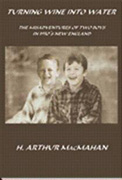
 |
Turning Wine Into Water: The Misadventures of Two Boys in 1930s New England
by H. Arthur MacMahan
Author House
During one summer of the 1930s, in the midst of the Great Depression, cousins Rickie and Junior are carefree from the confines of school, the world is their playground and their imaginations are boundless. The young boys love playing baseball, dragging their sticks against the picket fences like a xylophone, idolizing superheroes with makeshift costumes and mimicking paratroopers. They feel the weight and limitations of no money, often tempted by the few opportunities to get their hands on sought after prizes. But in the end their clever schemes and attempts at fun only lead them to trouble with ironic consequences. Despite all of their mishaps, nothing stops the two boys as they face their summer days with endless energy and determination.
H. Arthur MacMahan's tale of two all-American boys is akin to something like an old episode The Andy Griffith Show. The more Rickie and Junior conspire to have fun the more hassle it is for them in the end, but they never give up. This is what makes MacMahan's young protagonists so endearing and why we can't help but chuckle at their humorous predicaments.
While not overtly claimed to be autobiographical, the author does note he was the same age as Rickie and Junior during the Great Depression and fondly remembers "the unencumbered freedom that children enjoyed." Those memories are evident in Turning Wine Into Water, portrayed in Rickie and Junior's episodes. The novel's title is a reference to a particularly amusing incident involving the boys' fathers' home brew of wine. At times the dialogue is a bit heavy, which takes some getting used to and sometimes slows down the pace of the novel. Otherwise, Rickie and Junior's adventures, or misadventures rather, are pure, good fun to read.